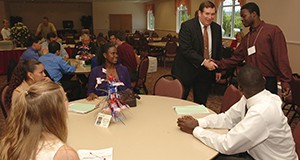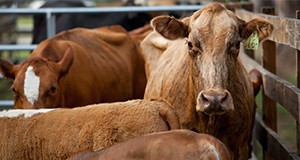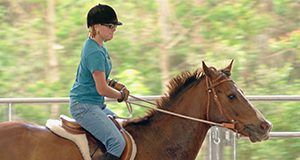This 13-page publication is one in the series Risk Management for 4-H Youth Development Work. It addresses the risks involving horses at 4-H events. Written by Saundra TenBroeck, Wendy DeVito, Dale Pracht, Chad Carr, Brittani Kirkland, and Georgene Bender and published by the UF/IFAS 4-H Youth Development Department, February 2018.
http://edis.ifas.ufl.edu/4h383
Tag: Georgene Bender
Volunteer Training Series: Recognizing Young People
 Developing a sense of belonging is one of the Essential Elements of a positive youth development experience. Creating an inclusive environment in your 4-H club programs and activities can help you achieve this goal. Providing many forms of recognition for all, not just for those who excel in competition with other youth, also supports this sense of belonging. This 5-page fact sheet discusses recognition of participation, progress toward goals, standards of excellence, peer competition, and cooperation in the context of 4-H Clubs. Written by Georgene Bender, Tracy Tesdall, and Judith Levings, and published by the UF Department of 4-H Youth Development, November 2015.
Developing a sense of belonging is one of the Essential Elements of a positive youth development experience. Creating an inclusive environment in your 4-H club programs and activities can help you achieve this goal. Providing many forms of recognition for all, not just for those who excel in competition with other youth, also supports this sense of belonging. This 5-page fact sheet discusses recognition of participation, progress toward goals, standards of excellence, peer competition, and cooperation in the context of 4-H Clubs. Written by Georgene Bender, Tracy Tesdall, and Judith Levings, and published by the UF Department of 4-H Youth Development, November 2015.
http://edis.ifas.ufl.edu/4h370
Risk Management for 4-H Youth Development Work: Large Animals: Livestock
 Most people involved in youth livestock exhibition are familiar with the physical risks of handling and transporting livestock, but public spectators generally need more instruction and supervision to ensure their safety and health. The Risk Management for 4-H Youth Development Work series aims to provide UF/IFAS Extension county faculty, staff, volunteers, and youth with the knowledge they need to implement best practices in risk management strategies. This 8-page fact sheet covers risks in the following categories: injuries to people, injuries to animals, property damage, biosecurity (diseases transmitted to humans and between animals), and general precautions. Written by Chad Carr, Saundra TenBroeck, Wendy DeVito, Chris Strong, Dale Pracht, and Georgene Bender, and published by the UF Department of Animal Sciences, November 2015.
Most people involved in youth livestock exhibition are familiar with the physical risks of handling and transporting livestock, but public spectators generally need more instruction and supervision to ensure their safety and health. The Risk Management for 4-H Youth Development Work series aims to provide UF/IFAS Extension county faculty, staff, volunteers, and youth with the knowledge they need to implement best practices in risk management strategies. This 8-page fact sheet covers risks in the following categories: injuries to people, injuries to animals, property damage, biosecurity (diseases transmitted to humans and between animals), and general precautions. Written by Chad Carr, Saundra TenBroeck, Wendy DeVito, Chris Strong, Dale Pracht, and Georgene Bender, and published by the UF Department of Animal Sciences, November 2015.
http://edis.ifas.ufl.edu/an321
Positive Discipline for Youth
 Working with youth, especially other people’s, can be a challenge. While some are better behaved than others, they all need acceptance and the opportunity to learn. Especially in groups of mixed ages, experience, or interests, the challenge of a youth leader is to see that disruptive youth do not prevent others from learning or having fun. Their very presence in the group, combined with your wise guidance, will help them learn what is socially acceptable and how to do what is right. This information sheet will help you to understand youth better and to provide some ideas on how to deal with the unruly kids with minimal disruption of the learning situation. This 5-page fact sheet was written by Heidi L. Radunovich, Keith G. Diem, and Georgene Bender, and published by the UF Department of 4-H Youth Development, July 2014.
Working with youth, especially other people’s, can be a challenge. While some are better behaved than others, they all need acceptance and the opportunity to learn. Especially in groups of mixed ages, experience, or interests, the challenge of a youth leader is to see that disruptive youth do not prevent others from learning or having fun. Their very presence in the group, combined with your wise guidance, will help them learn what is socially acceptable and how to do what is right. This information sheet will help you to understand youth better and to provide some ideas on how to deal with the unruly kids with minimal disruption of the learning situation. This 5-page fact sheet was written by Heidi L. Radunovich, Keith G. Diem, and Georgene Bender, and published by the UF Department of 4-H Youth Development, July 2014.
http://edis.ifas.ufl.edu/4h341
Florida 4-H Project Leader Guide (4HGCL22/4H316)
Adult volunteers who share knowledge and skills with youth as project leaders and mentors are critical to the success of 4-H. This 20-page guide provides an overview of the standards that guide the development and delivery of 4-H projects. For volunteers new to being a Florida 4-H Project Leader, the contents of this guide cover the basics of elements of 4-H that every project leader should learn. Written by Georgene Bender, Joy C. Jordan, Amanda Thein, Sarah Hensley, and Karen Henry, and published by the UF Department of 4-H Youth Development, March 2011.
http://edis.ifas.ufl.edu/4h316
